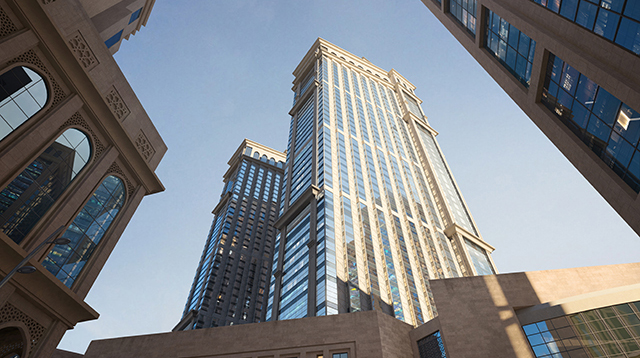
 McGovern (left) Choufany (second left) and Sona (right) at one of the sessions of the Future Hospitality Summit.
McGovern (left) Choufany (second left) and Sona (right) at one of the sessions of the Future Hospitality Summit.
Huge investments are being made in the region’s hospitality sector, particularly in the UAE and Saudi Arabia. However, the rising construction costs, funding delays and higher interest rates for development projects are putting a damper on the sector.
Despite these challenges, the Middle East remains a resilient market for hotel development, experts said at the Future Hospitality Summit held in Abu Dhabi last month.
Saudi Arabia, for instance, which is making considerable investment in tourism with its hotel development pipeline projected at around 275 hotels (80,000 rooms), is likely to be more impacted by rising construction costs and increased lending rates which may result in years of delays, said Hala Matar Choufany, President – Middle East, Africa and South Asia at HVS, a global consulting firm focused exclusively on the hospitality industry.
Choufany was among the expert panellists at the Future Hospitality Summit.
“Today, the UAE has circa 208,000 hotel rooms operating at an occupancy of around 70 per cent. It is estimated that an additional 45,000 hotel rooms are planned to open, which at a similar occupancy rate suggests an increase of 10 million accommodated room nights. Factoring in project delays, limited financing as well as increasing travel costs, we are of the view that arrivals will continue to grow, albeit at a lower pace when compared to 2022 and 2023 and the current inventory will absorb demand increases,” she said.
“While rising construction costs and higher interest rate can pose challenges to meeting tourism targets, the region – and particularly UAE and Saudi Arabia – has demonstrated a strong commitment to tourism as a driver of economic growth which may provide the incentive needed to overcome cost challenges,” she added.
Choufany also noted that many hotel projects in the pipeline are less dependent on debt financing and have lower return expectations when compared to the private sector and investment funds.
 |
|
Yazbeck (left) speaking at the Future Hospitality Summit. |
Tourism targets
So, given the rising costs, how realistic is it going to be to meet tourism targets?
“Governments in the region, especially in Saudi Arabia, have a target to achieve based on the country’s vision,” said Camil Yazbeck, Global Chief Development Officer – Premium, Midscale & Economy at Accor, considered to be the largest hospitality company in Europe, and the sixth largest hospitality chain worldwide. “We are seeing determination in meeting this target, with close collaboration between the public and private sectors to ensure project delivery on schedule.”
Yazbeck, who was a panellist at the summit, also cited the region’s strong economy, high level of spending power, and rising oil prices as factors that will support hotel development in the coming years.
He added that Accor sees great potential in Tier 2 and 3 cities with undiscovered natural beauty, evidenced by its May 2023 signing of a master development agreement with Amsa Hospitality to develop 18 premium, midscale and economy hotels across second-tier cities in Saudi Arabia over the next 10 years. In addition, a rise in religious tourism in Makkah, where Accor is already a key player with 10 hotels totalling 9,250 rooms, and Madinah, has created demand for further internationally branded supply.
Accor has been offering support to hotel owners to counter rising costs through increased efficiencies in areas such as design and technical services, purchasing and operations support.
How to mitigate impact
Hospitality experts also offered advice to hotel developers on how to mitigate the impact of rising construction costs.
“Targets can be achieved if companies tackle hotel constructions in a more creative and strategic way,” said Filippo Sona, Co-Chairman of Wood Couture. “By entertaining more lean processes and targets to shorten the overall timeframe, there will be savings on bank finance charges. Also, projects need to compass smaller development phases as opposed to having huge construction sites on the first phase, in order to spread the risk over time.”
Another panellist, Michael McGovern, Director at Compass Project Consulting, stressed the importance of meticulous strategic planning and close collaboration among stakeholders. “In the face of rising construction costs, meeting tourism targets in the Middle East remains a practical aspiration, but it hinges on meticulous strategic planning, close collaboration among stakeholders, and the embrace of innovative construction techniques,” he said.
Funding delays can have a significant impact on project timelines, according to the experts, who however pointed out that there are a number of strategies that developers can adopt to mitigate the impact of these delays.
“On a global level, we are seeing tighter lending conditions resulting in project delays, however of course this is dependent on the region and investor profile,” said Yazbeck.
Yazbeck said that Accor is seeing greater demand for conversion opportunities in regions that are experiencing funding challenges. Conversion opportunities accounted for around half of Accor’s openings in 2022.
Choufany said that based on historical development trends in the UAE, it is reasonable to assume that only 60 to 70 per cent of planned projects materialise and with a typical delay of 18 to 24 months.
She said that flexibility in project planning and design can be a valuable asset when faced with funding delays. Developers may choose to build modular or adaptable structures that can be expanded or scaled down as needed.
Sona pointed out that one of the major causes of project delays is the procurement of fixtures, furniture and equipment (FF&E) and added that a reverse engineering process, where suppliers are engaged at the design stage, can shorten the timeframe for FF&E procurement by three to four months.
McGovern stated that funding delays can significantly disrupt project timelines and developers must have robust financial contingency plans and diversified funding sources to buffer against delays. He also stressed the importance of collaborating with experienced project management consultancies and effective communication with financial partners.
Recovering costs
Higher interest rates will mean higher costs for hotel development projects, but there are a number of strategies that developers can adopt to recover these costs, according to the experts. By carefully considering the specific circumstances of their project and adopting a creative and flexible approach, developers can mitigate the impact of rising interest rates and ensure the success of their projects.
Yazbeck said that matching the right brand to the right project is essential. With the right match, Accor for example, can identify the clearest route to meeting the owner’s cost of capital and return on equity (RoE) expectations.
Yazbeck also highlighted Accor’s unique Augmented Hospitality offering, with multi-faceted and mixed-use development projects, which allows owners to counter rising costs through optimising their revenue across a development. These projects often include a mixture of elements that drive revenue 24/7; such as one or two hotel brands, an extended stay offering, branded residential, lively F&B, coworking, and wellness facilities; as well as allowing owners to equally have retail offering and other facilities within this same mixed-use project.
Choufany said that the approach taken to recover the higher costs will depend on a combination of factors and the specific circumstances of the hotel project.
“While it is not uncommon to increase room rates and F&B prices and/or implement operational efficiencies, other measures for new projects typically would include one or more of the following: delay or project scale down; diversifying income streams through re-engineering areas and offering, and sourcing different funding including but not limited to equity investors, government incentives/funding, or partnership opportunities,” she said.
Choufany also noted that interest rates are prone to fluctuations, governed by macro environment and therefore it is likely that construction loans will be refinanced with lower interest rates when the market conditions normalise.
Sona said that engineering value, as opposed to value engineering, is the name of the game. He added that rethinking and going back to the drawing board where possible is the solution. Where developments are advanced, there is the need to relook at costs or bring in innovative solutions to recuperate equity invested.
McGovern said that higher interest rates do pose a challenge, but they needn’t compromise project success. Developers often explore a combination of strategies, including adjusting pricing models and optimising operational efficiency. While some costs may be passed on to consumers, his approach emphasises maintaining the quality and guest experience. Developers can also explore partnerships, cost-effective technologies, and value engineering to manage heightened expenses while maintaining their projects’ competitiveness and profitability.








.jpg)




.jpg)




























.jpg)


































